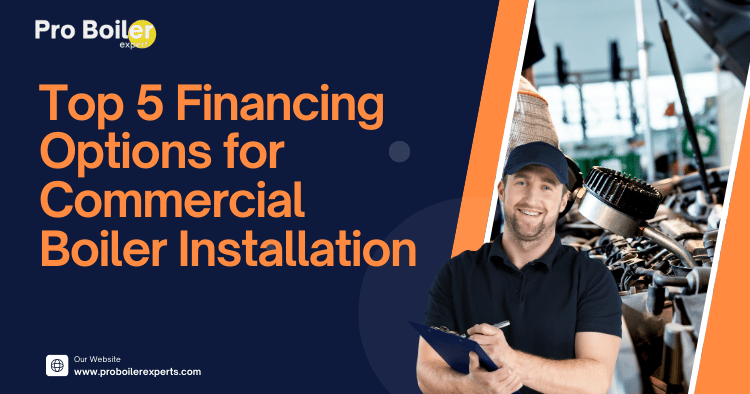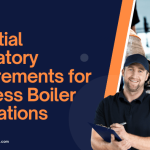Table of Contents
- Introduction
- 1. Traditional Bank Loans
- 2. Equipment Financing
- 3. Energy Efficiency Financing Programs
- 4. Leasing Options
- 5. Government Grants and Incentives
- Conclusion
- FAQs
Introduction
Investing in a new commercial boiler is a significant decision that can impact your business’s operational efficiency and energy costs. As of 2024, financing options are more varied than ever, allowing businesses to manage the costs of installation effectively. In this article, we’ll explore the top five financing options for commercial boiler installation, empowering you to make informed decisions that align with your business needs.
“A well-chosen financing option can be the difference between a successful installation and financial strain.”
1. Traditional Bank Loans
Traditional bank loans remain a reliable option for financing commercial boiler installations. These loans often feature competitive interest rates and flexible repayment terms, making them appealing for businesses planning significant investments.
Pros:
- Lower Interest Rates: Generally more favorable than many alternative financing options.
- Flexible Repayment Terms: Terms can range from 3 to 10 years, allowing you to choose what fits your budget.
- Larger Loan Amounts: Suitable for significant investments like boiler systems.
Cons:
- Lengthy Approval Process: Securing a loan can take time, which might delay your installation.
- Credit Requirements: A strong credit history is typically required.
“Consider reaching out to multiple banks to compare loan terms and find the best deal for your business.”
For more information on financing options, consider checking resources like NerdWallet’s guide on small business loans.
2. Equipment Financing
Equipment financing is tailored for businesses looking to acquire equipment, including commercial boilers. This option allows the boiler itself to serve as collateral, which can facilitate the approval process.
Pros:
- Quick Approval: The process is often faster than traditional bank loans.
- Low Down Payment: May require only a small deposit.
- Tax Benefits: The interest paid on the loan may be tax-deductible.
Cons:
- Higher Interest Rates: Generally not as low as traditional loans.
- Limited to Equipment: Funds can only be used for purchasing the boiler.
“Check with specialized lenders who understand the equipment financing landscape for better terms.”
When considering equipment financing, look for lenders that specialize in this area. Websites like Equipment Finance Advisor can provide valuable insights.
3. Energy Efficiency Financing Programs
In 2024, many states and utilities offer energy efficiency financing programs that incentivize businesses to upgrade to more efficient equipment, including commercial boilers. These programs can significantly reduce upfront costs.
Pros:
- Lower Initial Costs: Subsidies and rebates can offset installation expenses.
- Support from Local Utilities: Many programs are designed to promote energy efficiency.
- Long-Term Savings: Reduced energy bills lead to significant savings over time.
Cons:
- Eligibility Requirements: Not all businesses may qualify for these programs.
- Limited Availability: Programs vary by location and may change frequently.
“Investigating available programs early can help you take advantage of funding opportunities before they expire.”
To find energy efficiency financing programs in your area, check out the DSIRE database, which provides comprehensive information on incentives and policies supporting renewable energy.
4. Leasing Options
Leasing is a flexible financing option that allows businesses to rent a commercial boiler for a specified period. At the end of the lease, you can choose to buy, return, or lease a newer model.
Pros:
- Lower Upfront Costs: Often requires little to no down payment.
- Flexibility: Ability to upgrade to newer models at the end of the lease term.
- Fixed Payments: Easier budgeting with predictable monthly expenses.
Cons:
- No Ownership: You don’t own the boiler until you decide to purchase it.
- Potentially Higher Long-Term Costs: Leasing can be more expensive over time compared to purchasing outright.
“Leasing can provide a way to keep your equipment up-to-date without the hefty upfront investment.”
For more leasing options, consider visiting LeaseGuide.com for insights into equipment leasing.
5. Government Grants and Incentives
Many government programs provide grants and incentives to help offset the costs associated with commercial boiler installation. These funds are typically aimed at promoting energy efficiency and supporting businesses in various sectors.
Pros:
- Non-Repayable Funds: Grants don’t require repayment, making them very attractive.
- Encourages Sustainability: Many grants focus on energy-efficient technologies.
- Variety of Programs: Available at federal, state, and local levels.
Cons:
- Competitive Application Process: Grants can be highly competitive.
- Specific Eligibility Criteria: Not all businesses qualify for these funds.
“It’s important to prepare a strong application to increase your chances of securing a government grant.”
To identify available grants, visit Grants.gov, which serves as a comprehensive resource for federal funding opportunities.
Conclusion
Financing a commercial boiler installation in 2024 and beyond doesn’t have to be overwhelming. By exploring these top five financing options—traditional bank loans, equipment financing, energy efficiency programs, leasing, and government grants—you can find a solution that fits your business goals and financial situation. Each option has its merits and considerations, ensuring you can achieve a more energy-efficient operation while managing costs effectively.
“The right financing choice can not only ease your cash flow but also enhance your operational efficiency in the long run.”
FAQs
Q1: How long does it take to secure financing for commercial boiler installation?
A1: The timeline can vary based on the lender and your financial situation but typically ranges from a few days to a few weeks.
Q2: Are there tax benefits associated with financing a commercial boiler?
A2: Yes, depending on the financing option chosen, you may be able to deduct interest payments on your taxes. It’s advisable to consult with a tax professional for specifics.
Q3: Can I combine different financing options?
A3: Absolutely! Many businesses choose to blend various financing methods to optimize their funding strategy.
Q4: What should I consider before financing a boiler installation?
A4: Consider your budget, the total cost of ownership, the efficiency of the boiler, and your business’s long-term goals.
By understanding these financing options and their implications, you can make a more informed decision regarding your commercial boiler installation. For further insights, don’t forget to explore additional resources available on the Pro Boiler Experts website that discuss energy-efficient boiler options and financing solutions.





